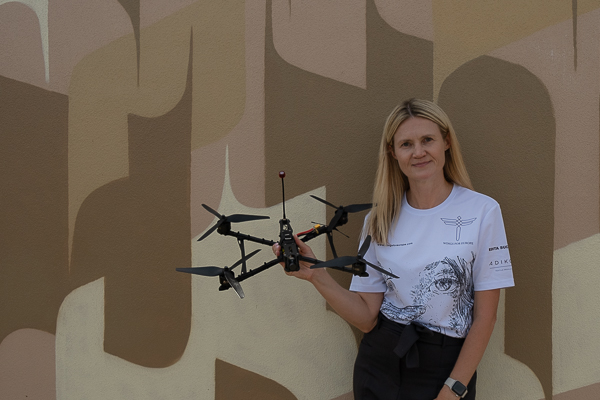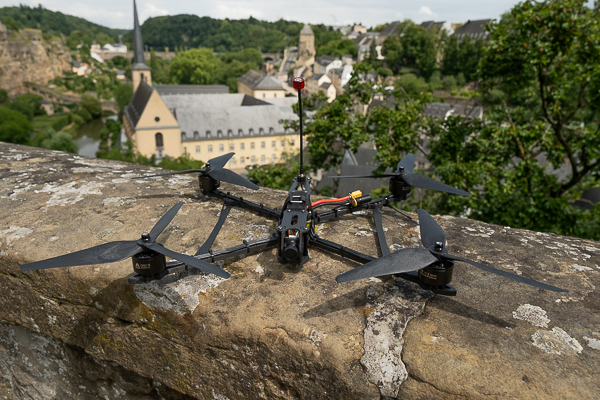 Kotryna Vilnonyte, President of Wings for Europe asbl;
Credit: Ali Sahib, Chronicle.lu
Kotryna Vilnonyte, President of Wings for Europe asbl;
Credit: Ali Sahib, Chronicle.lu
Wings for Europe, a non-profit and non-governmental organisation based in Belgium and Luxembourg, is mobilising supporters across the continent to assemble drones for Ukraine and raise awareness about the urgent need to strengthen European defences.
Established in 2023, the NGO brings together volunteers with diverse expertise - from humanitarian aid and defence analysis to drone technology and logistics - operating across eight European countries. The initiative is entirely donation-driven and relies on civilian engagement to produce and deliver First Person View (FPV) drones to Ukrainian defenders.
The organisation’s President, Kotryna Vilnonyte, shared with Chronicle.lu the mission, operations and expanding volunteer network of Wings for Europe - and why this citizen-led initiative is significant not only for Ukraine but also for Europe’s broader security.
Chronicle.lu: How did the idea for “Wings for Europe” first come about, and what inspired you to launch such a mission-driven initiative?
Kotryna Vilnonyte: Russia’s renewed aggression against Ukraine came as a shock. For a time, it seemed the situation might stabilise, but by the end of 2023, it became painfully clear: Ukraine was being left to face its fate alone. Arms deliveries slowed and support grew hesitant. We couldn’t just watch from the sidelines.
The idea started simply - one of us proposed assembling commercial drones to support Ukraine. That idea quickly spread among friends and then beyond. In Belgium and Luxembourg, a network of people began to form: some with experience in humanitarian aid, others with drone racing and technical knowledge, and many simply willing to help. Together, we pooled our skills and launched “Wings for Europe.”
Chronicle.lu: What is the organisation’s core mission, and why did you choose drones specifically as the focus of your support for Ukraine?
Kotryna Vilnonyte: This war isn’t just Ukraine’s fight, it’s a direct attack on the values, freedoms and security of all Europeans. If Ukraine falls, the war won’t stop there. The missiles and Shahed drones could soon be aimed at Brussels, Luxembourg or any European city.
Our mission is to mobilise public support and donations to assemble drones and deliver them to Ukrainian defenders. We focus on First Person View (FPV) drones because they’re one of the most cost-effective tools on today’s battlefield. Each drone costs around €350 to produce, as volunteers use their own equipment and premises. Yet our drones are capable of disabling Russian equipment worth hundreds of thousands - or even millions - of euros. While Western precision munitions are incredibly effective, they are few and prohibitively expensive, millions of euros each. Drones fill the gap. Over two-thirds of Ukraine’s strike effects now are due to drones. Our volunteers assemble drones at a fraction of the cost of commercial models, which typically run €600-1,000 or more. By focusing on drones, we’re making every euro count - saving lives and strengthening Europe’s overall resilience.
Chronicle.lu: How many drones have your volunteers managed to assemble and deliver so far, and what has been the highest monthly production you have reached to date?
Kotryna Vilnonyte: We haven’t yet reached the scale of producing thousands of drones, but we have delivered hundreds so far. Our production volume depends heavily on available funding from volunteers, supporters and partners. Each trained volunteer can assemble a drone in three to four hours. If there are enough of components, a volunteer can assemble between two and five per week during evenings and weekends. At peak, we assembled 40 drones in a single month. We currently have over 60 volunteers across European countries. The production capacity is there, we just need more funding to unlock it. Once assembled and tested, our drones are delivered via trusted partners to Ukraine, where they are upgraded with tactical components and employed to the front lines.
Chronicle.lu: Who are the “Angels of Light” behind this initiative, and how would you describe your current volunteer network across Europe?
Kotryna Vilnonyte: Our “Angels of Light” are everyone who stands with us - volunteers, donors, supporters, partners and ambassadors. They’re the people who refuse to look away and choose to act instead. Joining our “Legion of Light” is simple: anyone can visit our website and contribute to part of a drone, like a propeller or battery, or sponsor a full component set. Those who fund a full set receive a piece of original art from renowned artist Edita Suchockytė and get to name their drone. We even send them a photo of the named drone before it’s sent to Ukraine.
We now operate across Luxembourg, Belgium, France, Germany, the UK, Latvia, Lithuania and Ukraine. Many more would be ready to join once we secure additional funding for components. This is a growing community - and one built on shared purpose.
Chronicle.lu: How is the organisation financed – do you rely on regular donors, or is most of your funding raised through one-time campaigns and private contributions?
Kotryna Vilnonyte: Wings for Europe is entirely funded by private contributions and sponsorships. We receive no government funding. We partner with like-minded individuals, philanthropists, and businesses who believe in what we’re doing. In return, we offer visibility and involvement in a cause that directly strengthens European defence and solidarity. Every additional donation or other contribution enables us to buy more components and assemble more drones. The impact is direct and immediate.
Chronicle.lu: You recently visited the European Parliament - what was the purpose of your visit, and how did MEPs respond to your work?
Kotryna Vilnonyte: This wasn’t our first time engaging with the European Parliament. After past events, Members of Parliament even helped deliver our drones to Ukraine themselves and organised a fundraiser for this. We regularly organise themed events - educational, team-building and hands-on. These include drone assembly and piloting workshops for EU and NATO officials, national delegations and diplomatic missions. We also hold events for private companies to raise awareness and build support. Our most recent event was hosted for members of the European Parliament’s Security and Defence Committee. Together with defence experts, we explored the challenges and potential of drone warfare in Europe. Some MEPs were visibly moved by what they learned and have since expressed an interest in getting directly involved. We hope to announce joint projects with them soon.
Chronicle.lu: How do you see the future of drone-based support and civil tech initiatives across Europe, and what are the biggest challenges and opportunities ahead?
Kotryna Vilnonyte: In Ukraine, civilian involvement in defence is massive. People are assembling drones and 3D-printing components in their homes, because they know they can’t wait for governments or allies to solve everything. It’s a powerful model of civic resilience. In Europe, especially in the East, we also see some civic engagement. But in Central and Southern Europe, civic action remains limited - partly because people feel the war is far away. But it’s not. It’s a few thousand kilometres - or a fifteen-minute missile flight away. If Ukraine falls, the next war could be on NATO or EU soil. Drones offer a critical advantage. They’re affordable, scalable and increasingly essential in modern defence. Europe currently lags behind, while China produces 80% of the world’s drones. But we have the talent and infrastructure to catch up - if we act now. There’s a clear opportunity: Europe can build dual-use drone manufacturing capacity that serves both civilian and commercial needs, which could rapidly shift to military needs in a crisis. Investing in this now is not just smart policy - it’s essential for our long-term security.
(Caption: One of the drones produced by Wings for Europe Credit: Ali Sahib, Chronicle.lu)









